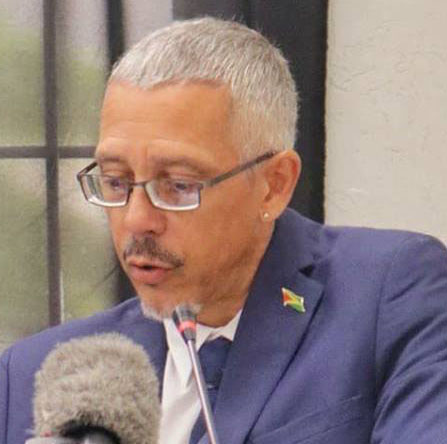Business Minister Dominic Gaskin has told a local private sector oil and gas forum that the Government of Guyana will not follow opponents of the prevailing contract with an ExxonMobil subsidiary down the road of calling for it to be undone and renegotiated.
In a presentation that will doubtless serve to intensify an already heated debate between government and various local individuals and institutions, Gaskin publicly associated himself with what has been the official position that the ruling APNU+AFC administration got a good deal.
His comment came at the same forum that ExxonMobil said it was not open to renegotiating the deal.
Last Tuesday’s event, billed as a private sector-organized “oil and gas conference” and one of the numerous fora of the kind held here in recent months saw Gaskin making a spirited attempt to stave off the sustained and mostly private sector criticism of the administration’s handling of the Production Sharing Agreement signed between the Government of Guyana and ExxonMobil’s subsidiary Esso Exploration and Production Guyana Limited.
“As far as the contract is concerned, the fact that a handful of people have been repeating on a daily basis that this contract is bad for Guyana and that we’re getting chicken feed does not make these statements true,” Gaskin said.
While conceding the right of the administration’s critics to find fault with the quality of its negotiations, the Business Minister ascribed ulterior motive to some of the criticism leveled at government.
”There seems to be a concerted effort to derail the progress of an industry that can bring about a much needed transformation of our economy,” Gaskin said, accusing critics of disseminating information that is “selective and misleading.”
The central theme of Gaskin’s presentation reposed in his attempt to refute the “chicken feed” argument made by critics of the Production Sharing Agreement.
“This is a new industry for Guyana and it’s one in which we don’t have any real experience, or any real expertise, or even suitable training programmes to help us build the capacity that we lack. It is an industry which requires high levels of up-front investment, well beyond what can be raised either from local sources or by local companies. Returns on that investment are also affected by price fluctuations and this increases the degree of risk for the investor”, he said.
Contending that the Guyanese people understand “that just having the oil sitting down three kilometers below sea level will not provide any benefits to us as a people other than the comfort of ownership”, Gaskin argued that in the absence of the country’s ability to extract oil the Guyanese people “need to be realistic”.
While sections of the media have been critical of what they have characterized as an exploitative relationship between ExxonMobil and the Government of Guyana, Gaskin said in his presentation that “there are not too many companies in the world that can do deep water oil exploration and production,” adding that the country’s relationship with the American oil giant “also involves a long-term relationship or partnership that is guided by an agreed upon contract, proper legislation and regulations and a fair amount of goodwill.”
Turning to the potential benefits to be derived, both directly and indirectly from Guyana’s accession to the status of an oil-producing country, Gaskin rolled out a ‘wish list’ that includes employment-related local participation, especially at the higher skill levels, training in areas where Guyana lacks capacity, local ownership of companies providing goods and services to the oil and gas sector as well as local equity in oil exploration and production companies. Additionally, Gaskin told the conference that arising out of the advent of an oil and gas industry Guyana would wish to see knowledge transferred from foreign to local individuals and entities including government.
“We’d like to see the transfer of knowledge, skills, best practices, and technology from the petroleum sector to other sectors of our economy in order to enhance our productivity and improve national competitiveness,” Gaskin declared, adding that these goals can be realized through “a strong local content framework” through legislation, regulations or by writing those local content provisions into petroleum agreements.









